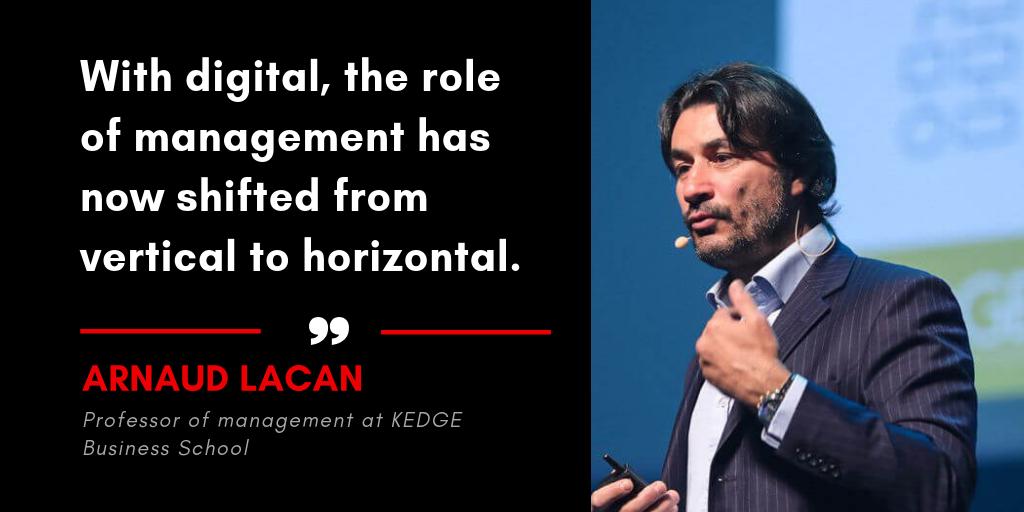Digital is revolutionizing management
Digital is revolutionizing management
Article from Arnaud Lacan for the Octave webmagazine
We simply can’t go on managing as we always have. And we need to sit up and pay attention, our performance depends on it: we need to let go of our obsolete models and start using new managerial practices in line with our connected world. The origin of the word management is in how an organization is run (from the Latin manus the hand, and agere to act). So in fact it’s the art of making everything happen in the best possible way to achieve the best performance by a team. So managers need to make sure that they are fully aware of what their employees really want. In this context, the switchover to digital has changed everything, and the whole concept of team management needs to be overhauled.[1]
The development of digital technologies has made the idea of measuring individual performance obsolete, because digital is first and foremost about community (social media, professional networks, informative websites, etc.). And yet, until recently, responsibility for this development was (and still too often remains) sat firmly on the shoulders of managers. This is no longer true, and the idea must now be set aside to make way for new managerial practices. Indeed, as we now have more and more data, and access to that data is increasingly easy, managers are no longer revered for being the source of all knowledge: and therefore are not always necessary. Digital has transformed everyday life at work, in our relationships with the world around us, space, time and other people. We can now work in partnerships with people in other countries, we can be based anywhere, and work at any time, without having face-to-face meetings. Digital technology also brings instant information, we can mine from data deposits at our fingertips (Wikipedia, tutorials, forums for sharing experiences), at the tap of a smartphone[2]. Managers are no longer experts whose lofty positions are justified by their rare knowledge. They have now become facilitators of collective performance.
Individual performance measuring was key in companies whose organization, from production to management, was based on measuring and checking by means of reports and an ever-increasing number of processes. But the development of digital technology brought the need for a change in companies, rendering the idea of measurement obsolete. With the rise of group goals, relationships with deeper connections, a new concept must now prevail in companies: managerial regulation[3]. The aim of this concept is first to organize how people work together, then to ensure that the conditions are conducive to personal well-being, so that the highest level of performance is a natural outcome.
The cornerstone of regulation is a new form of management that strives to achieve a transition from simply working together to really cooperating for everyone’s benefit: both the company and its employees. Steering that process is a new management figurehead, who strives to be a linchpin as much as a creator of meaning, a team leader as much as a regulator of the intensity and pace of the workload and the conditions in which it is carried out: the leader-manager, who sets down the guidelines and reassures, who gives employees room to grow, who sets the teams in motion and steers them on the path to collective performance. Leadership is the aspect of management we need if we are to meet the challenges thrown up by major societal disruption, in our completely digital era. And that is even more important in looking for ways to provide support for new generations (Y and Z generations), the latter having been born with both feet in the digital world.
Management must now provide good reasons why employees should enjoy working together, why they should function as a tribe, united for the same cause, and driven by the same principles of efficiency and cooperation. Relationships in the world of work must be peaceful, because they are well-managed. The center of gravity for managers’ responsibilities has shifted, and companies in the digital era no longer expect them to control individual performance, but regulate interpersonal relationships to create the best conditions for well-being at work: the prerequisite for collective performance.
Managers have no choice but to evolve with digital technology and the upheavals it brings. They are now proving themselves by what they can bring to their teams, in their ability to help it perform as a group to the best of its ability. With digital, the role of management has now shifted from vertical to horizontal.
[1]You can read all about it in our article that was published in Futuribles: François Silva and Arnaud Lacan “Overhauling management: how digital is disrupting company structure and management”, Futuribles, No. 408, September-October 2015.
[2] Around 75% of French people own a smartphone.
[3] The word regulation serves as a reminder that we’re aiming to achieve optimum results from a complex system.
[3] La régulation dont la définition nous rappelle qu’elle vise à assurer le bon fonctionnement d’un système complexe.
 Arnaud Lacan is a professor of management at KEDGE Business School. This specialist in new managerial practices is the current AGIPI KEDGE chair for “Independent work and new forms of entrepreneurship” and associate researcher at Aix-Marseille School of Economics (AMSE, CNRS & EHESS UMR 7316). He is also a public speaker, and has given lectures on widespread managerial disruption, new expectations for the workplace, and new ways organization techniques.
Arnaud Lacan is a professor of management at KEDGE Business School. This specialist in new managerial practices is the current AGIPI KEDGE chair for “Independent work and new forms of entrepreneurship” and associate researcher at Aix-Marseille School of Economics (AMSE, CNRS & EHESS UMR 7316). He is also a public speaker, and has given lectures on widespread managerial disruption, new expectations for the workplace, and new ways organization techniques.
Share this Post








